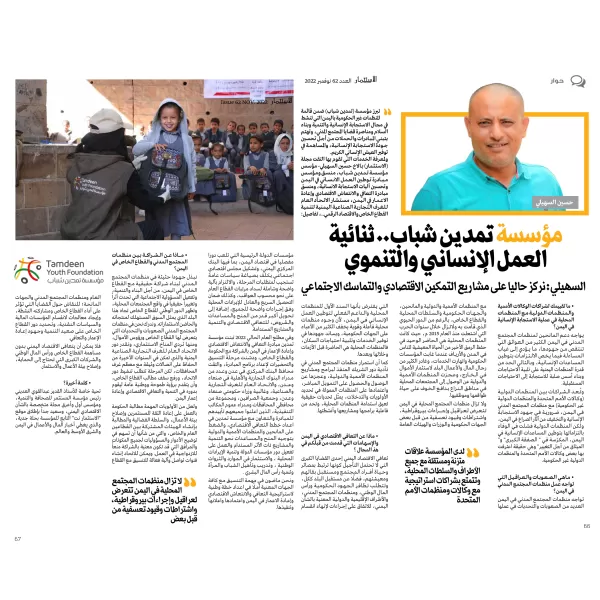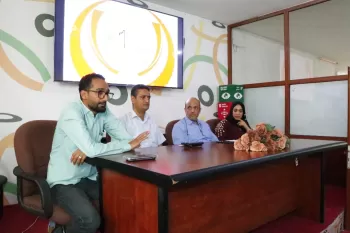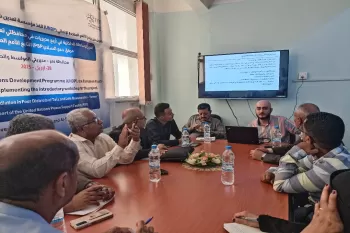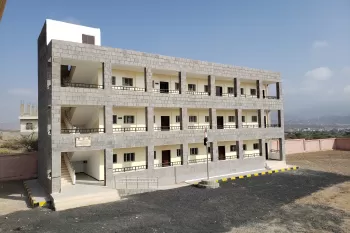For Al Estithmar Magazine, "The recovery of Yemen's economy requires partnership between the government, private sector, and civil society organizations." Hussein Al Suhaily
It is interested in adopting initiatives and campaigns to improve the quality of humanitarian response, and contribute to a decent human living. With knowledge of TYF's services, Al Estithmar Magazine met with Mr. Hussein Al Suhaily, Founder of Tamdeen Youth Foundation, Coordinator and Founder of the Localization of Humanitarian Action and Optimization of its Response Mechanisms Initiative in Yemen, Coordinator of the Recovery, Economic Recovery and Reconstruction Initiative in Yemen, Consultant to the Federation of Yemen Chambers of Commerce and Industry for the Private Sector Development and the Digital Economy..... Details:
Mr. Hussein Al Suhaily
Founder of Tamdeen Youth Foundation
Coordinator and Founder of the Localization of Humanitarian Action and Optimization of its Response Mechanisms Initiative in Yemen
Coordinator of the Recovery, Economic Recovery and Reconstruction Initiative in Yemen
Consultant to the Federation of Yemen Chambers of Commerce and Industry for the Private Sector Development and the Digital Economy
What services does Tamdeen Youth Foundation provide?
Tamdeen Youth Foundation is a non-governmental, non-profit civil society organization that works in humanitarian response, socioeconemic development, peace-building and social cohesion.
It was officially established on the 25th of March 2013 with license No. (378) issued by the Ministry of Social Affairs and Labor in Yemen, in accordance with Law No. (1) of 2001.
TYF strives to alleviate the war's suffering of millions of Yemenis. By the end of 2021, it has reached more than 2,879,104 beneficiaries. Its programs aim to provide and ensure access to essential services such as health, nutrition, food security, education, WHAS and protection without any discrimination and in a manner that preserves human dignity.
During the current year, TYF's projects and activities have been focused on economic empowerment and social cohesion, in accordance with the Triple Nexus Approach of aligning humanitarian response, peace and development. The Foundation is assisted by its highly qualified and experienced youth cadres and teams in volunteering, innovation, humanitarian and development action. TYF has also strategic partnerships with many international, regional and local organizations.
Is the work of Tamdeen Youth Foundation confined to certain areas? What difficulties do you face?
TYF's scope of work is in all regions of Yemen. It has main offices in Sana'a, Aden, Taiz, Ibb and Mokha and a regional office in the Jordanian capital, Amman, as well as branch offices, and field offices for projects currently being implemented.
The Foundation has balanced and independent relations with all parties and local authorities, and has strategic partnerships with United Nations agencies and organizations and with a range of international organizations. It also has access to and implementation of its projects and activities in all governorates of Yemen.
Tamdeen Youth is the most active and prominent foundation in the list of NGOs in Yemen in coordinating the work of civil society, delivering its voice and advocating for its issues. It is concerned with the adoption of initiatives and campaigns as an important part of its work to harness all available resources and capabilities in order to improve the quality of humanitarian response, and contribute to providing a decent human living.
What is your assessment of the partnerships of UN agencies and international organizations with local organizations in the humanitarian response process in Yemen?
Donors support to CSOs in Yemen faces many obstacles that detract from their efforts, leading to a lack of accountability for humanitarian aid localization commitments, thereby limiting the ability of Yemeni organizations to meet needs and build solid foundations to respond to future needs.
Partnerships between international organizations (UN agencies and international NGOs with civil society organizations in Yemen are essential in humanitarian response and conflict mitigation efforts in Yemen. However, international organizations have failed to fulfill their commitments to localize humanitarian assistance in Yemen, enshrined in the Grand Bargain and the Charter for Change. This fact has been recognized by some United Nations agencies and international NGOs.
What are the difficulties and obstacles facing the work of CSOs in Yemen?
Civil society organizations in Yemen face many difficulties and challenges in their work with UN and international organizations, donors, government agencies, local authorities and the private sector, despite the vital role they have played and continue to play during the years of war since 2015. Where local organizations were the only present in preserving the last breath of people's living life in cities and rural areas when government institutions were absent and services collapsed, and many businessmen left the country to invest money abroad. UN and international organizations were unable to reach communities in conflict zones out of fear for the lives of their staff.
CSOs in Yemen are still subjected to obstacles, bureaucratic procedures, arbitrary requirements and restrictions by some government agencies, ministries and public bodies, which are supposed to be the first support for local organizations and the actual supporter of the localization of humanitarian action in Yemen, because the presence of effective and strong local organizations reduces many of the burdens on government agencies, and supports their efforts in providing services and meeting the needs of the population, as local organizations are present before, during and after crises.
The continued role of civil society organizations as implementing partners of United Nations and international organizations' programs and projects, their inability to access and obtain direct funding, and their dependence on funded organizations in setting priorities and interventions pose real challenges to the sustainability of local organizations and limit the effectiveness of their programs, projects and activities.
In 2021, you launched the localization of humanitarian action and optimization of its response mechanisms initiative in Yemen.
With the prolonged humanitarian crisis in Yemen, and the failure of the response process led by the United Nations to change people's communities' lives for the better due to its continued approach to emergency and relief interventions with limited sustainable impact, and ignoring the directing of resources towards recovery, economic empowerment and development. I had the honor to coordinate the preparation of (the localization of humanitarian action and optimization of its response mechanisms initiative), which was launched in August 2021 in a joint statement of 66 Yemeni NGOs. The initiative is to address the humanitarian crisis through a medium and long-term economic and development perspective that takes into account and priorities of communities, beneficiary groups and government agencies, and to empower local organizations and partnering with them in identifying needs and projects with a sustainable socioeconomic impact that generates income and job opportunities, while linking humanitarian interventions with social cohesion, economic recovery and development.
For the localization initiative, I assumed great responsibilities and faced many difficulties, but what motivated me to move forward was the serious interaction of colleagues in civil organizations and foundations, the positive response from many officials in government agencies, and our meetings with the Humanitarian Affairs Coordinator and the Director of “OCHA” in Yemen, the Secretary-General of the Supreme Council for the Management and Coordination of Humanitarian Affairs “SCMCHA”, the Ministry of Planning and International Cooperation in Aden, representatives of a number of international organizations, Arab and international civil networks and coalitions, and the General Federation of Chambers of Commerce and Industry, where we have seen from all the recognition of the legitimacy of “localizing humanitarian action in Yemen and reviewing the current approach to humanitarian response”.
Where have you reached with the localization of humanitarian action and optimization of its response mechanisms initiative in Yemen?
The initiative was developed through participatory discussions with local organizations, government agencies, the private sector, United Nations agencies, and international NGOs, after which a team for the localization of humanirtarian action in Yemen was formed. The team organized consultative discussions with the world's networks and organizations for the localization of humanitarian response. Itar Foundation was chosen as a local partner, in coordination with the International Council of Voluntary Agencies (ICVA) and Tamdeen Youth Foundation, to implement a baseline research for the localization in Yemen.
With the support of the Danish Refugee Council (DRC), Tamdeen Youth Foundation began in October 2022 organizing consultative meetings with stakeholders to discuss the localization indicators of the baseline report, and preparing a national strategy for the localization of humanitarian action in Yemen, and its advocacy plan.
The strategy will represent a participatory national framework for the localization of humanitarian action and an implementation plan that ensures optimizing response mechanisms in Yemen and linking them to economic recovery and development. It will also make a structural change in the quality of interventions and the design of programs and projects, and partnership in planning, implementing and monitoring humanitarian response plans while adhering to the utmost transparency in the aid provided by countries and donors to Yemen.
What about the economic recovery in Yemen and the contributions made by you in this field?
The recovery of Yemen's economy is one of the major issues that cannot be postponed as it is related to the destinies and lives of members of society and their future survival and livelihood, as well as the future of Yemen as a whole. It requires concerted efforts by government, national capital, civil society organizations, and regional and international parties concerned with the Yemeni issue to agree on measures to end the division of the main state institutions that play a pivotal role in Yemen's economy, including the Central Bank of Yemen, and the establishment of a Socioeconomic Council to formulate public policies responsive to the requirements of the phase, commitment to a clear and comprehensive mechanism for calculated reimbursement of public sector salaries, as well as to ensure the rapid and fair collection of local revenues in accordance with clear procedures clear for all; in addition to transferring the largest amount of grants, aid and loans, to economic recovery, development and sustainable projects.
At the beginning of 2022, Tamdeen Foundation, in partnership with the government and the private sector, adopted the Recovery, Economic Recovery and Reconstruction Initiative in Yemen. It launched the coordination phase and preparations for the initiative program. It also met with the governor of the Central Bank in Aden and a number of directors of commercial and private banks in Sana’a and Aden, and the General Federation of Chambers of Commerce and industry, most of the ministers of the governments of Sana’a and Aden, Yemeni Exchangers Association, and a group of governorates governors and directors of all executive offices, who all declared their support for the initiative and cooperation with Tamdeen Youth Foundation in preparing economic recovery plans, and lobbying donors and UN and international organizations to direct grants and aid towards development and projects with a sustainable impact, and to promote the role of Yemen's institutions, develop local revenues, invest in national resources and wealth, train and rehabilitate youth and women, and develop human capital.
We continue to coordinate with all stakeholders in the hope of preparing, adopting, announcing and implementing a national plan for the recovery, economic recovery and reconstruction strategy in Yemen.
What about the partnership between CSOs and the private sector in Yemen?
We are actively working in civil society organizations to build a real partnership with the private sector in Yemen for construction and development, and to operationalize social responsibility that makes a real impact and change in the reality of local communities, and shows the national role of the private sector towards this country, which represents the consumer market for its products and the incubator for its investments.
We in civil society organizations recognize the difficulties and challenges faced by the private sector and capital, including the deteriorating investment climate. We also appreciate the role of the General Federation of Yemeni Chambers of Commerce and Industry, which has been able in recent years to maintain close contacts with most governorate chambers. However, the phase requires activating the role of the Federation, raising the ceiling of the demands of the private sector, and presenting an ambitious and general national vision to play its role in development, economic recovery and reconstruction of Yemen.
An important priority would be to call on the government to restore investor confidence, and reform the business environment, the judiciary, and the establishment of joint bodies between the public and private sectors, which would contribute to clarifying the roles and responsibilities of all components and facilities that might be concerned with the partnership in order to prevent duplication of work.
The Federation can establish effective communication channels and coordination mechanism with the public sector, civil society organizations and donors to discuss issues affecting the performance and active participation of the private sector, find solutions to the division of financial institutions and monetary policies, and identify the private sector's role in development, reconstruction and recovery efforts.
Yemen's economy cannot recover without the contribution of the private sector, national capital, and large corporations in need of protection, as well as the reform of the business and investment environment.
Last Words?
A special greeting to Mr. Abdul Qawi Al Odaini, Chairman of Al Estithmar Foundation for Press and Development, and founder of the first and most prestigious magazine specialized in Yemeni economic affairs. I am very happy for them to launch "Al Estithmar Net", the Foundation's website in a new way, which covers financial and business news in Yemen, the Middle East and the world.




